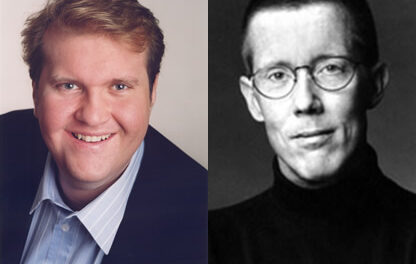Candle under a bushel department: it’s undeniably true that institutions of higher learning are under unusual stress, and perhaps one sign of this is that the fine UNCG School of Music, Theatre and Dance is seemingly unable (I certainly hope that it is not unwilling or uninterested) to do a proper job of promoting its activities, either on campus or in the broader community in Greensboro and the Triad. Bassoonist Scott Pool visited UNCG for teaching and a solo recital, and those responsible for production (student workers, presumably supervised at some level by adult, full-time staff) were unable to open the concert locale prior to the announced concert time, and more significantly had no printed programs to hand out to concert-goers. Folks, this is the minimal level of attention that needs to be given to an event publicized and open to the general public, and UNCG couldn’t muster even this minimal level. Someone needs to receive a severe speaking-to. What is worse is that the lack of promotion meant that there was barely a minyan (ten adults) in attendance at the UNCG Organ Hall, with half of those coming from the bassoon program at UNCG. The Triad (the area within a half-hour drive of UNCG) has a population of 1.6 million. Surely more than five of those residents have an interest in classical music. UNCG needs to divert significantly more of its resources to getting those listeners into the seats at UNCG events.
Pool was joined for the first two items on his recital by UNCG faculty member Inara Zandmane (piano). Opening the evening was a lovely transcription of a Rachmaninoff song, “Ne poy, krasavitsa, pri mne” (“Do not sing, my beauty”), a very early work, from his Six Romances, Op. 4, written when the composer was about twenty; it is full of Russian romantic pathos. After this appetizer, Pool offered one of the many Vivaldi concerti for his instrument (RV 497, in A minor), and though to my taste Baroque concerti accompanied by modern grand piano is a step too far, he demonstrated excellent technique and musicianship, every note clear, without ever verging on the mechanical.
The most rewarding portions of the program were the two contemporary works that followed. “Kyrie,” by Russell D. Brown, is an electroacoustic work for bassoon and pre-recorded sounds – a very nice evocation of medieval music, but in an entirely modern idiom, with the bassoon blending in and out of the electronic backdrop, and with very effective use of pitch slides. Up next was an extended work, Blur, for unaccompanied bassoon by Chris Arrell, a composer at Holy Cross in Worcester, Massachusetts, which begins in a “blur” of 32nd notes, and moves gradually, over the course of thirteen minutes or so, from a high level of complexity to relative simplicity, incorporating multiphonics, singing while playing, key-clicks, with a narrative that carries the listener along. Pool’s exceptional technique (his playing seems effortless) meant that he held the listener’s interest throughout.
The dessert following this meaty work was the early Romantic showpiece, the Andante and Rondo Hongrois, Op. 35, by Weber, once again with Zandmane at the piano, with Pool closing the work and the recital with a spectacular display of fireworks in the sextuplets leading to the final cadence. A highly worthwhile evening of music!
UNCG’s upcoming programs are listed in CVNC‘s calendar.











